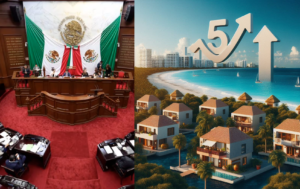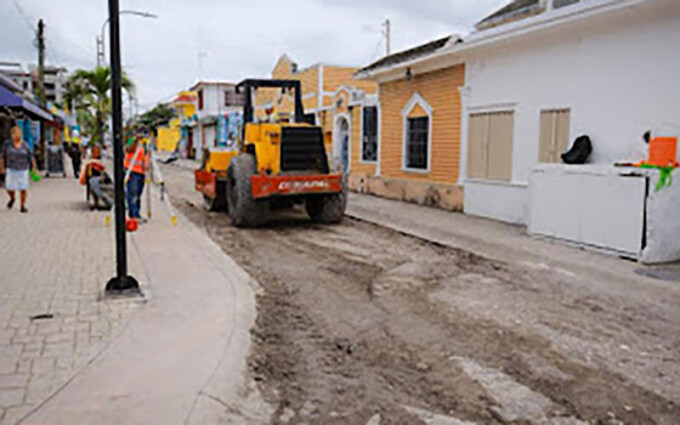Cozumel Quintana Roo new tax real estate brokers
Cozumel Quintana Roo new tax real estate brokers
Congress of Quintana Roo approves reform that imposes a new tax on real estate brokers
Text & Translation by Moises JH & Tono Lopez
Cozumel, Quintana Roo, Mexico – In a statement from the state of Quintana roo they inform the community that: “To strengthen tax collection and regulate the real estate market, the Congress of Quintana Roo approved a comprehensive reform that imposes a new 5% tax on real estate intermediaries, known as brokers, for each real estate sale transaction.”
The reform, promoted by Governor María Elena H. Lezama Espinosa, includes modifications to several key legal provisions, including the State Treasury Law, the Tax Code, the Valuation Law, the Organic Law of Public Administration, the Law of the Tax Administration Service, the Cadastre Law and the State Rights Law. These modifications seek to ensure that all actors in the real estate market contribute equitably to the state treasury.
According to article 22 of the Treasury Law of the State of Quintana Roo, “taxpayers who obtain income from the sale of real estate must pay a tax of 5% on the taxable base determined in each transaction.” Disposal of property refers to selling it and transferring the real right to another person, which means that brokers must pay this tax on the profit obtained in each transaction.
According to her information, the main objective of this reform is not only to increase tax revenues, but also to guarantee more rigorous and equitable compliance with tax obligations among those involved in the real estate market. The measure seeks to strengthen the rule of law in the payment of the schedular tax for the alienation of real estate, benefiting the citizens of Quintana Roo by ensuring that all participants in the real estate market contribute fairly.
In some media, it is reported that this 5% tax applies exclusively to brokers and will not affect sellers and buyers.
In summary, while taxes on the purchase and sale of homes can generate revenue for governments and have certain benefits in terms of public policies, they can also have secondary effects that must be carefully considered to minimize negative impacts on the real estate market and in the individuals involved.
These would be the disadvantages:
- Decrease in real estate market activity
- Increase in housing prices
- Reduction of residential mobility
- Impact on the local economy
- Regional inequality
- Tax evasion
- Administrative complexity
- Impact on foreign investment
Followers of Cozumel4You, what do you think is this measure is positive or will it cause any effect on the state and the economy of the island of Cozumel?
Congreso de Quintana Roo aprueba reforma que impone nuevo impuesto a brokers inmobiliarios
Texto & traducción de Moises JH & Tono Lopez
Cozumel, Quintana Roo, México – En un comuicado del estado de Quintanaroo informan a la comunidad que: “ Fortalecer la recaudación fiscal y regular el mercado inmobiliario, el Congreso de Quintana Roo aprobó una reforma integral que impone un nuevo impuesto del 5% a los intermediarios de bienes raíces, conocidos como brokers, por cada transacción de venta de inmuebles”.
La reforma, impulsada por la gobernadora María Elena H. Lezama Espinosa, incluye modificaciones a varias disposiciones legales clave, entre ellas la Ley de Hacienda del Estado, el Código Fiscal, la Ley de Valuación, la Ley Orgánica de la Administración Pública, la Ley del Servicio de Administración Tributaria, la Ley de Catastro y la Ley de Derechos del Estado. Estas modificaciones buscan asegurar que todos los actores del mercado inmobiliario contribuyan equitativamente al erario estatal.
Según el artículo 22 de la Ley de Hacienda del Estado de Quintana Roo, “los contribuyentes que obtengan ingresos por la enajenación de bienes inmuebles deberán pagar un impuesto del 5% sobre la base gravable determinada en cada operación”. Enajenar una propiedad se refiere a venderla y transferir el derecho real a otra persona, lo que significa que los brokers deberán pagar este impuesto sobre la ganancia obtenida en cada transacción.
Según su informacion el objetivo principal de esta reforma es no solo aumentar los ingresos fiscales, sino también garantizar un cumplimiento más riguroso y equitativo de las obligaciones tributarias entre los involucrados en el mercado inmobiliario. La medida busca robustecer el estado de derecho en el pago del impuesto cedular por la enajenación de bienes inmuebles, beneficiando a los ciudadanos de Quintana Roo al asegurar que todos los participantes en el mercado inmobiliario contribuyan de manera justa.
En algunos medios de comunicación, se informa que este impuesto del 5% aplica exclusivamente a los brokers y no afectará a los vendedores y compradores.
En resumen, mientras que los impuestos a la compra-venta de viviendas pueden generar ingresos para los gobiernos y tener ciertos beneficios en términos de políticas públicas, también pueden tener efectos secundarios que deben ser cuidadosamente considerados para minimizar impactos negativos en el mercado inmobiliario y en los individuos involucrados.
Estos serian de las desventajas:
- Disminución de la actividad del mercado inmobiliario
- Aumento de los precios de las viviendas
- Reducción de la movilidad residencial
- Impacto en la economía local
- Desigualdad regional
- Evasión fiscal
- Complejidad administrativa
- Impacto en la inversión extranjera
Seguidor de Cozumel4You ¿tu que crees de esta medida es positiva o causara algun efecto en el estado y en la economia de la isla de cozumel?.
Antonio Lopez .Bachelor of Communication Sciences and Techniques with 13 years of experience in the media.
- Cozumel Royal Caribbean beach Club controversy - December 11, 2025
- Renew AntiAging Rebel - November 7, 2025
- Rebel Pilates Renew Anti-Aging - October 31, 2025
Moses Jimenez. Content creator for more than 20 years, 18 of them on the island of Cozumel. Collaborator in multiple informative projects and social diffusion. Antonio Lopez . Bachelor of Communication Sciences and Techniques with 13 years of experience in the media.
Cozumel Royal Caribbean beach Club controversy
Cozumel: The Beach Club Conflict, the Cruise Trust, and Local Art Text...
ByMoises Jimenez & Antonio LopezJuly 26, 2024IRONMAN Routes, Local Merchant Complaints, and the 2025 WTTS Summit
IRONMAN Cozumel 2025: Schedules, Route, and Road Closures As every year, Cozumel...
ByMoises Jimenez & Antonio LopezJuly 26, 2024Cozumel Road Closures
Road Closures in Cozumel Downtown Due to Construction: Controversy at the Start...
ByMoises Jimenez & Antonio LopezJuly 26, 2024Cozumel Airport Expansion
Government Greenlights Major Expansion for Cozumel International Airport Text & Translation by...
ByMoises Jimenez & Antonio LopezJuly 26, 2024





















Leave a comment